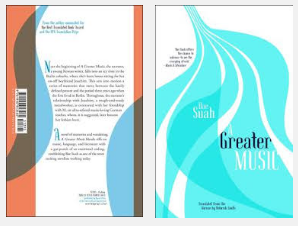Forget the story. What animates Bae Suah’s A Greater Music is the question of whether there are greater (and lesser) forms of art. Or perhaps “question” is the wrong word; perhaps “compulsion.” Perhaps “need,” or “hope,” or “memory.” Perhaps love. Perhaps grief. Perhaps what animates this little novel is the question of the capital letter in Art and how Love might mean more than a word, beyond sentiments; how a greater music might index the presence of a soul beyond death, an art beyond life, or a Love that can survive the ending of a love affair. It’s a novel about the persistence of something in the meaningless void, the faith that there might be something, and also the loneliness of living in the uncertainty. Or maybe it’s just a tone poem set to language, a dream of the lovely, dark, and deep edges of twilight in Berlin in the winter snow, and a love letter to a lost love.
As I try to write my way around what makes this novel feel like that, the words I’m writing turn into clichés, into the kinds of abstractions that make it feel sophomoric to dwell on the absolute. After all, art, love, death… are there words more thoroughly standardized and deadened by overuse? There are passages in A Greater Music that, if they are forced to stand on their own, might read like a freshman philosophy seminar, as when the novel begins with a radio announcer using the phrase, “A Greater Music,” words that provoke the narrator to reverie. “We never say ‘greater death,’” she remarks,
"death being an absolute value that does not admit comparison. Like one’s hand, that can be flipped to show either the back or the palm, it’s something that can exist as only one of two possibilities. Music is absolute, just like death. Just as ‘greater death’ or ‘lesser death’ is a logical impossibility, so the same can be said of music which is of the same order as the soul.”
“The night was deep,” she writes, “the lamps stood unlit, and the paved road was uneven; the tram stop was some way off”:
"Beneath the raindrops, still more raindrops were falling, not at a constant speed, but continuously. Beside them other raindrops were falling, also at unappointed intervals, and beside them still more raindrops, and beside them still more . . . thus was the world beneath the massed clouds captured and occupied. It was the empire of a mathematics which, for all its exquisite detail, was freed from the strictures of an orderly rhythm, and played extempore.”
There is a story, of sorts. The protagonist is a Korean writer in Germany for eleven months—and also a return, years later—and her resemblance to Bae Suah is not a coincidence.
